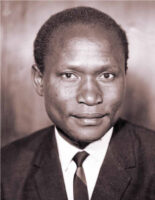
Freedom fighter Ramogi Achieng Oneko will be remembered as a principled politician who was ready to die for his country. He was the only freedom fighter who was detained by the colonial and the Kenyatta regime, and lived to tell the story. He was in Prime Minister Jomo Kenyatta’s first Cabinet as the Minister for Information and Broadcasting.
Born in Tieng’a village in Uyoma, Bondo, in 1920, Oneko’s first job after leaving Maseno School was as a weather reporter for the Meteorological Department. He worked under a Briton he detested. Then he tried his hand in politics in 1949 when he became one of the first African municipal councillors in Nairobi.
Oneko was among the first Kenyans to establish a Dholuo newspaper, Ramogi Weekly, in 1945. Its sole purpose was to agitate for freedom. He had the support of Nairobi printer, G. L. Vidyathi. The East African Standard, the only daily newspaper, catered for the interests of the colonial Government, the British settlers and the business community.
Dr Ongong’a Oneko, the freedom fighter’s eldest son says: “He started it as a family business and later opened it up to others. The driving force of the venture was to generate an income and to spread political news to our people. The East African Standard was reporting Kenyatta in a biased manner, and that was why my dad decided to start his own weekly.”
Oneko was also the secretary of the Luo Thrift and Trading Corporation, established by his friend Oginga Odinga, between 1948 and 1951. Oneko first met Kenyatta in the late 1940s, when he interviewed him for the paper. At the time, Kenyatta was the leader of KAU. The two became bosom buddies and were later arrested, with four other colleagues, and detained for being members of the Mau Mau movement.
Oneko was the closest to Kenyatta during their highly publicised trial in the remote Kapenguria. The court did not find Oneko guilty, but he was re-arrested and detained with Kenyatta and the other four at Lokitaung, a remote outpost in north-western Kenya. They became popularly known as the “Kapenguria Six”.

According to Oneko, the colonial authorities believed that he was too close to Kenyatta, whom he regarded as an intellectual and articulate speaker. They were, therefore, separated and locked up in different detention camps. The two trade unionists, Kubai and Kaggia, were deemed too radical. It is claimed that they believed Kenyatta had abandoned the liberation struggle or would be an interim leader.
Kenyatta and Oneko considered Karumba illiterate, but conceded that he was more committed to the liberation struggle. Ngei, the first to start a Kikamba newspaper just before the declaration of the State of Emergency in 1952, was also labelled a radical and his colleagues thought he was a bit selfish and did not believe fully in Kenyatta.
